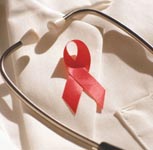HIV vaccine may raise AIDS risk for some
 London, November 15: A report has warned that an HIV vaccine made by Merck, which failed to stimulate an immune response in recent clinical trials, might have indeed raised the susceptibility to the AIDS virus for some participants.
London, November 15: A report has warned that an HIV vaccine made by Merck, which failed to stimulate an immune response in recent clinical trials, might have indeed raised the susceptibility to the AIDS virus for some participants.
The finding has raised new concern as to how trials with similar vaccines should be handled in future.
The preliminary analyses of the trial, suspended in September, showed that the vaccine had failed to protect participants against HIV.
The vaccine comprised of three HIV genes carried by a weakened viral vector, made from a common-cold virus called adenovirus 5. Neither the HIV genes nor the vector was capable of causing infection.
However, it appears that trial participants who had pre-existing immunity to adenovirus 5 were more likely to become HIV-positive upon the administration of the vaccine.
Twenty-one of the 392 male volunteers who had high levels of antibodies against the adenovirus became infected in the vaccinated group, as compared to 9 of 386 in the placebo group. The vaccine did affect infection rates in men without adenovirus-5 immunity.
Anthony Fauci, director of the National Institute of Allergy and Infectious Diseases in Bethesda, Maryland, has revealed that a trial with another HIV-vaccine has been delayed for several months to provide more time for scientific review.
Scientists are now trying to find out whether the vector is to blame for the increased susceptibility of some participants to the AIDS virus or the risk was raised due to unrelated causes.
Lawrence Corey, lead investigator of the HIV Vaccine Trials Network, says that alternatives to adenovirus 5 are being developed, and may be substituted once the efficacy of a vaccination strategy has been shown.
He, however, admits that vaccine developers will have to take challenging decisions in the light of the new findings.
“Translating uncertain data into policy is always a difficult issue, ” Nature magazine quoted him as saying. (ANI)